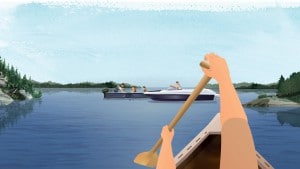North Carolina’s Laws for Negligent or Reckless Boat Operation
In North Carolina, reckless boat operation means operating any boat, or manipulating any waterskis, aquaplane, or similar devices in a willfully or wantonly reckless or negligent manner that endangers the life, limb, or property of any person.
Examples of reckless operation include:
- Weaving through congested boat traffic.
- Jumping the wake of another boat within 100 feet of that boat, or when the visibility around the other boat is obstructed.
- Intentionally approaching another boat in order to swerve at the last possible moment to avoid a collision.
- Operating contrary to the ‘rules of the road’.
- Following another boat too closely.
- Towing a person behind your boat in a manner that causes the person being towed to collide with another person or an object.
- Permitting passengers to ride on the bow, gunwale, transom, seat backs, raised decks or any other location on the boat where there is a risk of falling overboard.
Boat Speed Limit Laws in North Carolina
The operation of a boat at a speed that may cause inconvenience, danger, damage, or injury is illegal in the state of North Carolina. Local speed limit regulations may vary depending on the area/body of water.
Any boat entering, leaving or passing within 50 yards of a state-owned or controlled boating and fishing access area is required to operate at a ‘No-Wake’ speed.
Any person operating a boat within 100 feet of a law enforcement boat that is displaying a flashing blue light is required to slow their boat to a ‘No- Wake’ speed, unless the boat is in a narrow channel, in which case they are required to slow to a ‘No-Wake’ speed when within 50 feet of the law enforcement boat that is displaying a flashing blue light.
Restricted Areas
It is illegal in the state of North Carolina to operate a personal watercraft (PWC) on state waters at a speed greater than ‘No-Wake’ when within 100 feet of a:
- Moored or anchored boat.
- Dock or pier.
- Swim float.
- Marked swimming area.
- Swimmers.
- Surfers.
- Persons engaged in fishing activities.
- Human-powered boats.


